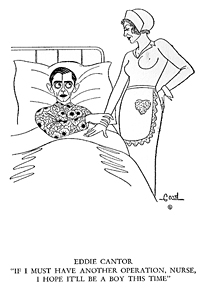Here are 10 things you should know about Florence Rice, born 116 years ago today. After enjoying success on Broadway, she worked steadily in films over a brief Hollywood career.
Tag: Ring Lardner
Our Evening with Kitty Carlisle

Did we ever tell you about the time we met Kitty Carlisle? No? Well, let’s rectify that right now.
 In 2005, we attended a screening of June Moon at NYC’s Film Forum. It’s a 1931 adaptation of a play written by George S. Kaufman and Ring Lardner that hadn’t been screened since its initial run more than seventy years prior.
In 2005, we attended a screening of June Moon at NYC’s Film Forum. It’s a 1931 adaptation of a play written by George S. Kaufman and Ring Lardner that hadn’t been screened since its initial run more than seventy years prior.
To mark the occasion, Anne Kaufman Schneider, Kaufman’s daughter, and James Lardner, Lardner’s grandson, were on hand.
And so was Kaufman-Schneider’s pal, Kitty Carlisle-Hart, who was then just two months away from turning 95. She was, of course, the widow of former Kaufman collaborator Moss Hart.
We thought the world of Hart (still do)—Kitty was one of our favorite New Yorkers, and, since she was seated directly behind us, we decided to turn around and tell her as much.
“Thank you, dear,” she said when we told her it was an honor to be sitting in front of her. “I do hope you’ll try to scrunch down in your seat so I can see the movie.”
We promised to do our best.
A few minutes passed, and we felt a finger tapping on our shoulder. We turned around.
“May I have some of your popcorn,” Ms. Carlisle-Hart asked, pointing at the nearly full bag of popcorn on the floor next to our seat (we were both seated on the aisle).
“By all means—have just as much as you like.”
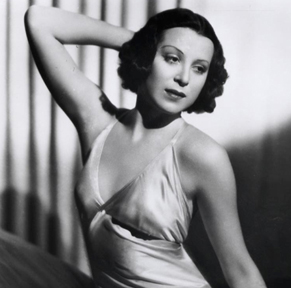 And she did just that, reaching over and grabbing a handful of corn several times through the course of the picture.
And she did just that, reaching over and grabbing a handful of corn several times through the course of the picture.
We were thrilled. Someone who once starred opposite the Marx Brothers was sharing our popcorn! And we were impressed, too—we hope, when we’re 95, we’re still up to bending over and snagging some popcorn from a bag on the ground.
We spent most of the movie contorted every which way in order to keep our fat head from blocking Ms. Hart’s view of the screen, and after the final credits, we turned around and asked her if our efforts had been successful.
“I didn’t miss a thing,” she said effusively. “Thank you so much!”
We chatted briefly for a moment or two more, and we screwed up enough courage to ask her if she would consent to our conducting an interview with her one day soon, if we could find a publication interested in running it, and she readily agreed, telling us how we could contact her if and when the time came.
Later, we spoke to Ms. Kaufman-Schneider, thanking her for the Q&A she had participated in after the movie. She was great—whip-smart, opinionated (she hated the movie, and wasn’t afraid to say so), frank, and witty.
She asked me if we weren’t the young fellow whose popcorn Kitty had been filching; we admitted that we were.
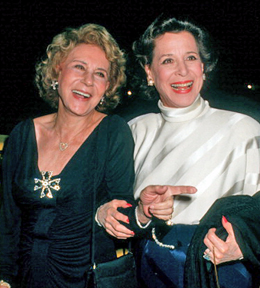 “I don’t know what to do with her,” she said with a twinkle in her eye. “She said to me, ‘I’m hungry, and this nice young man has some popcorn,’ and I couldn’t talk her out of it.”
“I don’t know what to do with her,” she said with a twinkle in her eye. “She said to me, ‘I’m hungry, and this nice young man has some popcorn,’ and I couldn’t talk her out of it.”
We assured her that we had been pleased to share our snack and thanked her again.
We never managed to conduct that interview with Kitty; she passed away just short of two years later and we somehow didn’t manage to get our ducks in a row in time. But we’ll always treasure the memory of our encounter with her.
And we figure that, if there’s an afterlife (and we’re inclined to think there is), we’ll have someone to show us around a bit. Surely she won’t mind introducing us to the Marx Brothers, for starters, and to our favorite What’s My Line panelist, Arlene Francis. Kitty, of course, was a regular panelist on To Tell the Truth, but she was a guest panelist on What’s My Line more than once, and we’d bet our bottom dollar that she and Arlene got along like two peas in a pod.
We figure it’s the least she can do. After all, we shared our popcorn with her, right?
Times Square Tintypes: Joe Cook
THE FOUR HAWAIIANS
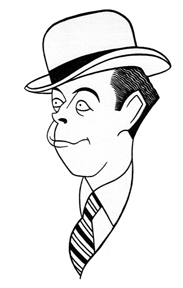 His real name was Joseph Lopez. Was orphaned at the age of four. Then adopted by a family named Cook in Evansville, Ind. He spent his teens in a cold water flat on Amsterdam Avenue near 135th Street.
His real name was Joseph Lopez. Was orphaned at the age of four. Then adopted by a family named Cook in Evansville, Ind. He spent his teens in a cold water flat on Amsterdam Avenue near 135th Street.Times Square Tintypes: John Golden
“PURE AS THE DRIVEN SNOW”
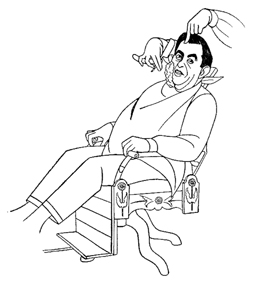 Was once a bricklayer and the vice president of a chemical company. From the experience gained at the latter he is proficient in making gin.
Was once a bricklayer and the vice president of a chemical company. From the experience gained at the latter he is proficient in making gin.In Your Hat, pt. 12
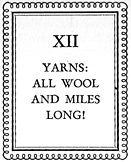
| If you took a rabbit out of those suckers’ hats They would squawk just the same: They all have two strikes on them When they are born. TEXAS GUINAN
|
“May every hat check bring you a fat check—and may no meanie neglect my Renee—who never wrecks hats each time she checks hats—Frances Williams.”
“Oh, look, I am in your book—thanks for letting me.”
“To Renee, who expects something clever from me but won’t get it.”
“To Renee, from her worst customer.”
“To a real and sweet girl, with loads of knockouts.
Tony Canzoneri,
Lightweight Champion of the World.”
“To Renee—
“Who takes what you give graciously. All life is a game of give and take. For what she takes she gives in a return a smile, a cheerful greeting and your belongings. May you go a long ways and prosper. Keep smiling Renee, it’s what we all go for.”
“To Renee—
Duchess of Sardi,
from
Baron George Jessel,
Colonel of the Bronx Grenadiers
And Vis-count of Brownsville.”
“You’ll always be Miss Shapiro to me—one of my best yarns. Sidney Skolsky
P.S. She sleeps in the raw!”
“My hat’s off to you. (Get it?) Je parle français aussi. (I hope that’s right).”
“My autograph I here inscribe,
A member of the organ tribe
Jesse Crawford,
Poet (?) of the Organ.”
“Keep your face towards the sun and the shadows will fall behind you.”
“A mon amie Renee en souvenir des Ziegfeld Follies 1931.”
“A hat girl who has more in her head than all the brains those hats cover. A little princess on a door mat—An oriental pearl in a suffocating shell—a ruby in a musty purse, but watch her.”
“To Renee. In memory of my first daughter of four kilos.”
“Because I like red-heads.”

